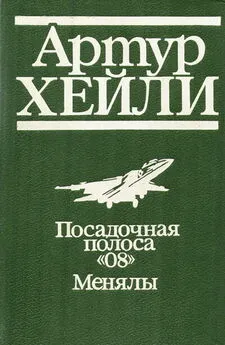Артур Хейли - Аэропорт / Аirport
- Название:Аэропорт / Аirport
- Автор:
- Жанр:
- Издательство:неизвестно
- Год:2020
- Город:Москва
- ISBN:978-5-17-121013-7
- Рейтинг:
- Избранное:Добавить в избранное
-
Отзывы:
-
Ваша оценка:
Артур Хейли - Аэропорт / Аirport краткое содержание
Для удобства читателя текст сопровождается комментариями и кратким словарем.
Предназначается для продолжающих изучать английский язык (уровень 4 – Upper-Intermediate).
Аэропорт / Аirport - читать онлайн бесплатно ознакомительный отрывок
Интервал:
Закладка:
“ Get down here fast! ”
From the fact that his wife’s voice was low, Mel deduced there were others within hearing. Just the same, she managed to convey a surprising amount of venom.
Mel sometimes tried to associate the voice of Cindy nowadays with the Cindy he remembered before their marriage fifteen years ago, when they first met in San Francisco, he on leave from the Navy and Korea. She had been a gentler person then, it seemed to him. She had been an actress at the time, though she had had a succession of diminishingly small parts in summer stock and television, and afterward, in a moment of frankness, admitted that marriage had been a welcome release from the whole thing. Years later that story changed a little, and it became a favorite gambit of Cindy’s to declare that she had sacrificed her career and probable stardom because of Mel.
“You knew perfectly well that tonight was important to me, and a week ago you made a definite promise.”
“A week ago I didn’t know we were going to have the biggest storm in six years…”
“You’ve people working for you, haven’t you? Or are the ones you’ve chosen so incompetent they can’t be left alone?”
Mel said irritably, “They’re highly competent. But I get paid to take some responsibility, too.”
“It’s a pity you can’t act responsibly to me.”
Mel sensed that Cindy was getting close to boiling point. Without any effort, he could visualize her now, clear blue eyes flashing, and her blonde coiffed head tilted back in that damnably attractive way she had when she was angry. In their early years of marriage, his wife’s temper outbursts seldom dismayed him. In the past, when his eyes had made their appreciative assessment, some two-way physical communion sprang into being, prompting each to reach out, to touch one another, impulsively, hungrily. The result was predictable. The origin of Cindy’s anger was forgotten in a wave of sensuality.
It was, of course, not a way of resolving differences which were fundamental. As the years passed, and passion lessened, accumulated differences became more sharply accented.
Eventually, they ceased entirely to use sex as a panacea and, in the past year or so physical intimacy of any kind had become more and more occasional.
“Most of the time I go along with what you want, even though I don’t think the things we go to are all that important. What I would enjoy are a few more evenings at home with the children.”
“That’s a lot of crap,” Cindy said.
Perhaps she was right, to an extent. Earlier this evening he had been reminded of the times he had stayed at the airport when he could have gone home—merely because he wanted to avoid another fight with Cindy.
But apart from that, tonight was different. He ought to stay on at the airport.
“I do know you’re my wife, which is why I intend to get down there just as soon as I can.” A thought struck him. “Incidentally, what’s the occasion tonight?”
“It’s a publicity party to promote the costume ball which is being given next month for the Archidona Children’s Fund. The press is here. They’ll be taking photographs.”
Now Mel knew why Cindy wanted him to hurry. With him there, she stood a better chance of being in the photographs—and on tomorrow’s newspaper social pages.
“Did you say the Archidona Fund? Which Archidona? There are two. One’s in Ecuador, the other in Spain.”
For the first time, Cindy hesitated. “What does it matter?”
Mel wanted to laugh out loud. Cindy didn’t know. As usual, she had chosen to work for a charity because of who was involved, rather than what.
“How many letters do you expect to get from this one?”
To be considered for listing in The Social Register , a new aspirant needed eight sponsoring letters from people whose names already appeared there. At the last count Mel had heard, Cindy had collected four.
Cindy asserted, savagely, “Listen to me! You’d better get here tonight, and soon. If you don’t come, or if you do come and embarrass me by saying anything of what you did just now, it’ll be the end.”
She hung up.
When seated at his desk, Mel shivered as earlier. Then, abruptly in the silent office, a telephone bell jangled. For a moment he ignored it. It rang again, and he realized it was the red alarm system telephone on a stand beside the desk.
“Bakersfeld here.”
He heard clicks and more acknowledgments as others came on the line.
“This is Air Traffic Control,” the tower chief’s voice announced. “We have an airborne emergency, category three.
9
Keith Bakersfeld, Mel’s brother, was a third of the way through his eight-hour duty watch in the air traffic control radar room.
In radar control, tonight’s storm was having a profound effect, though not a directly physical one. To a spectator, Keith thought, it might have seemed that the storm, raging immediately outside, was a thousand miles away. The radar room had no windows. Day and night, at Lincoln International, ten radar controllers and supervisors labored in perpetual semidarkness under dim moonglow lights. Around them, tightly packed equipment—radarscopes, controls, radio communications panels—lined all four walls.
The pervading tone in the radar room was calm. However, beneath the calmness, at all times, was a constant nervous strain. Cause of the added tension today was a signal on a radarscope which, in turn, had triggered a flashing red light and alarm buzzer in the control room. It denoted an aircraft in distress. In this case, the aircraft was a U.S. Air Force KC-135, high above the airport in the storm, and seeking an immediate emergency landing.
The tower watch chief on the floor above had been promptly informed of the distress signal. He, in turn, had declared a category three emergency, alerting airport ground facilities.
The flatface scope, at the moment the center of attention, was a horizontal glass circle set into a tabletop console. Its surface was dark green, with brilliant green points of light showing all aircraft in the air within a forty-mile radius. As the aircraft moved, so did the points of light. Beside each light point was a small plastic marker, identifying it. Controllers moved them by hand as aircraft progressed and their positions on the screen changed. As more aircraft appeared, they were identified by voice radio and similarly tagged. Tonight there was an extraordinary number of aircraft on the screen.
Keith was seated closest to the flatface. His body was tense, he was concentrating, his face strained, as it had been for months. The green reflection of the scope accentuated deep hollows beneath his eyes. Anyone who knew Keith well, but had not seen him for a year or so, would have been shocked both by his appearance and his change in manner. Keith was six years younger than his brother, Mel, but nowadays appeared a good deal older.
The radar supervisor, Wayne Tevis, was observing Keith covertly at this moment, watching the signs of increasing strain. Tevis was ready, if necessary, to relieve Keith from radar watch, a decision which instinct told him might have to be made at any time.
His eyes on Keith’s flatface scope, Tevis drawled, “Keith, that Braniff flight is closing on Eastern. If you turn Braniff right, you can keep Eastern going on the same course.” It was something which Keith should have seen himself, but hadn’t.
The problem, which most of the radar room crew was working at feverishly, was to clear a path for the Air Force KC-135, which had already started down on an instrument landing approach from ten thousand feet. The difficulty was—below the big Air Force jet were five airline flights, stacked at intervals of a thousand feet, and orbiting a limited airspace. All were awaiting their turn to land. A few miles on either side were other columns of aircraft, similarly stacked and, lower still, were three more airliners, already on landing approaches. In between them all were busy departure corridors. Somehow, the military flight had to be threaded down through the stacked civilian airplanes without a collision occurring. The situation was complicated by radio failure in the KC135, so that voice contact with the Air Force pilot had been lost.
Keith Bakersfeld thumbed his microphone. “Braniff eight twenty-nine, make an immediate right turn, heading zero-nine-zero.” At moments like this voices should stay calm. Keith’s voice was high-pitched and betrayed his nervousness. The Braniff captain obeyed instructions. When a controller gave the order “ immediate, ” pilots obeyed instantly and argued later.
In another minute or so the Braniff flight would have to be turned again, and so would Eastern, which was at the same level. As part of the game, pieces had to be raised or lowered while they still moved forward, yet none must come closer than three miles laterally or a thousand feet vertically from another, and none must go over the edge of the board. And while all of it happened, the thousands of passengers, anxious for their journeys to end, had to sit in their airborne seats—and wait.
Behind him Keith could hear Wayne Tevis trying to raise the Air Force KC-135 on radio again. Still no response. The position on the blip showed the pilot was doing the right thing—following exactly the instructions he had been given before the radio failure happened.
The Air Force flight, Keith knew, had originated in Hawaii and come non-stop after mid-air refueling over the West Coast, its destination near Washington. But west of the Continental Divide there had been an engine failure, and afterward electrical trouble, causing the airplane commander to elect an unscheduled landing at Smoky Hill, Kansas. At Smoky Hill, however, the KC-135 was diverted to Lincoln International. It was soon afterward that radio failure had been added to the pilot’s other troubles.
Most times military aircraft stayed clear of civil airports. But in a storm like tonight’s help was asked and given without question.
Keith Bakersfeld was trying hard to maintain his concentration, to retain a mental picture of his sector and every aircraft in it. It required instant memorizing—identifications, positions, types of aircraft, speeds, altitudes, sequence of landing…a configuration which was never still. A controller’s nightmare was to “lose the picture,” a situation where an overtaxed brain rebelled and everything went blank. It happened occasionally, even to the best.
Keith had been the best. Until a year ago, he was one whom colleagues turned to when pressures built to unreason.
Now, colleagues shielded him as best they could, though there was a limit to how much any man could help another and do his own job, too.
Keith was on his own; Tevis, the supervisor, had propelled himself and his high stool across the room to check another controller. Keith’s mind clicked out decisions. Turn Braniff left, Air Canada right, Eastern through a hundred and eighty degrees. It was done; on the radar screen, blips were changing direction. He would not lose the picture; not tonight, not now.
There was a reason for not doing so; a secret he had shared with no one, not even Natalie, his wife. Only Keith Bakersfeld, and Keith alone, knew that this was the last time he would ever face a radarscope or stand a watch. Today was his last day with air traffic control. It would be over soon.
It was also the last day of his life.
“Take a break, Keith.” It was the tower watch chief’s voice. Keith had not seen him come in.
Keith knew at once why he was being relieved. There was still a crisis, and they didn’t trust him.
Читать дальшеИнтервал:
Закладка:










